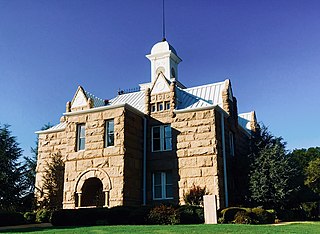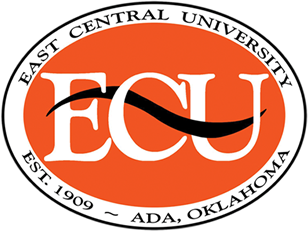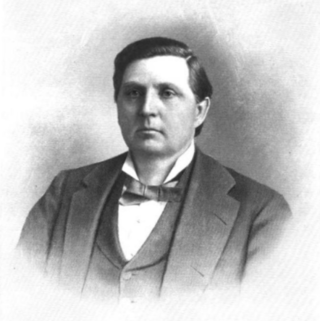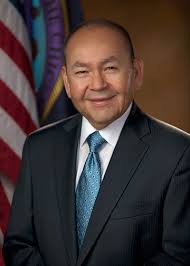
Johnston County is a county located in the U.S. state of Oklahoma. As of the 2020 census, the population was 10,272. Its county seat is Tishomingo. It was established at statehood on November 16, 1907, and named for Douglas H. Johnston, a governor of the Chickasaw Nation.

The Chickasaw are an Indigenous people of the Southeastern Woodlands, United States. Their traditional territory was in northern Mississippi, northwestern and northern Alabama, western Tennessee and southwestern Kentucky. Their language is classified as a member of the Muskogean language family. In the present day, they are organized as the federally recognized Chickasaw Nation.

Tishomingo is the largest city in, and the county seat of, Johnston County, Oklahoma, United States. The population was 3,101 as of the 2020 Census, an increase of 2.2% over the population of 3,034 reported at the 2010 census. It was the first capital of the Chickasaw Nation, from 1856 until Oklahoma statehood in 1907. The city is home to Murray State College, a community college with an annual enrollment of 3,015 students. Tishomingo is part of the Texoma region.

East Central University is a public university in Ada, Oklahoma. It is part of Oklahoma's Regional University System. Beyond its flagship campus in Ada, the university has courses available in McAlester, Shawnee, and Durant, as well as online courses. Founded as East Central State Normal School in 1909, its present name was adopted in 1985. Some of its more prominent alumni include former Microsoft COO B. Kevin Turner, Modernist painter Leon Polk Smith, former NFL player Mark Gastineau, past governors Robert S. Kerr and George Nigh, former U.S. Representative Lyle Boren, Oklahoma Supreme Court Justice Tom Colbert, and U.S. Army General James D. Thurman.

The Choctaw Nation of Oklahoma is a Native American reservation occupying portions of southeastern Oklahoma in the United States. At roughly 6,952,960 acres, it is the second-largest reservation in area after the Navajo, exceeding that of the seven smallest U.S. states. The seat of government is located in Durant, Oklahoma.

The Chickasaw Nation is a federally recognized Indigenous nation with headquarters in Ada, Oklahoma, in the United States. The Chickasaw Nation descends from an Indigenous population historically located in the southeastern United States, including present-day northern Mississippi, northwestern Alabama, southwestern Kentucky, and western Tennessee. Today, the Chickasaw Nation is the 12th largest Indigenous nation in the United States, with a population exceeding 80,000 citizens, most of whom reside in Oklahoma.

Murray State College is a public community college in southcentral Oklahoma with the main campus located in Tishomingo, Oklahoma. It is named in honor of former Oklahoma Governor William H. "Alfalfa Bill" Murray.

Douglas Hancock Cooper Johnston, also known as "Douglas Henry Johnston", was a tribal leader who served as the last elected governor of the Chickasaw Nation from 1898 to 1902. He was re-elected in 1904.

Lisa Johnson Billy is a Chickasaw and American politician who has served in the legislatures of Oklahoma and the Chickasaw Nation. She has served as a tribal councillor for the Chickasaw Nation since 2016 and previously served on the council between 1996 and 2002. She represented Oklahoma House of Representatives district 42 from 2004 to 2016 and was appointed by President of the United States Donald Trump to the board of trustees of the Morris K. Udall and Stewart L. Udall Foundation in 2017.

Neal A. McCaleb was an American civil engineer and Republican politician from Oklahoma. A member of the Chickasaw Nation, McCaleb served in several positions in the Oklahoma state government and then as the Assistant Secretary of the Interior for Indian Affairs under President George W. Bush.

The Chickasaw Cultural Center is a campus located in Sulphur, Oklahoma near the Chickasaw National Recreation Area. Its 184-acre (74 ha) campus is home to historical museum buildings with interactive exhibits on Chickasaw tribal history, traditional dancing, and Chickasaw language. The campus includes a historically accurate traditional tribal village recreated in the rear lot and a garden honoring members of the Chickasaw Nation Hall of Fame. It is one of two museum campuses presented by the Chickasaw Nation, the other being the First Americans Museum in downtown Oklahoma City, Oklahoma.
Mary Frances Thompson Fisher, best known as Te Ata, was an actress and citizen of the Chickasaw Nation known for telling Native American stories. She performed as a representative of Native Americans at state dinners before President Franklin D. Roosevelt in the 1930s. She was inducted into the Oklahoma Hall of Fame in 1957 and was named Oklahoma's first State Treasure in 1987.
Overton James was an educator and Governor of the Chickasaw Nation. After graduating from college, he taught school in Oklahoma. He was first appointed Governor in 1963 and served until 1971. He was then elected to that position and served until his last term ended in 1987. In 1985, he was alleged to have accepted illegal kickbacks for construction contracts within the Chickasaw Nation. He was indicted, pleaded guilty, and sentenced to a short prison term.
Charles W. Blackwell was an American lawyer, educator, activist, and diplomat, who served as the first Ambassador of the Chickasaw Nation to the United States of America, from 1995 until his death in 2013. Blackwell was the first Ambassador of any Native American tribal government to the government of the United States. From 1990 to 1995, he had served as the Chickasaw Nation delegate to the US Congress, while also working on issues of health, education, and economic development for tribal nations.

Harry James Watson "Jimmy" Belvin (1900–1986) was a Choctaw educator and politician who served as an Oklahoma State Representative and Senator. He was the first elected principal chief of any of the Five Civilized Tribes in the 20th century, and the longest serving principal chief of the Choctaw Nation of Oklahoma. He saw his tribe through termination, restoration, and a rebirth of Native Pride. He was a polarizing leader, seen by some as a semi-dictator who held onto the office of principal chief and used his power to advocate for complete assimilation into the dominant society, suppressing Choctaw traditions, language and ceremonial practices as undesirable remnants of an unrefined history. To others, he was a well-liked, populist leader, who went door-to-door talking with tribe members, informing them on issues, and trying to develop the means the alleviate the poverty and unemployment they faced.
Cyrus H. Harris, a mixed-blood Chickasaw born in Mississippi, was elected the first Governor of the Chickasaw Nation, and served five non-consecutive two-year terms. Although his formal schooling was limited at an elementary level, he became fluent in both the English and Chickasaw languages. He and his family relocated to Indian Territory in 1837, where he was employed in business and also served as an interpreter and developed a keen interest in Chickasaw politics. In 1856, he was elected to his first term as governor of the newly established Chickasaw Nation His accomplishments included organizing a national government after the Chickasaw Nation and Choctaw Nation formally separated into two distinct entities. He also executed a formal alliance between his nation and the Confederate States of America after the outbreak of the American Civil War. After the cessation of hostilities, he played a major role in the recovery of the nation from its devastated condition. He retired from politics in 1874, after serving his fifth term as governor. He died in 1887 at his home in Mill Valley, and was buried at the cemetery in Mill Valley.
Margaret Roach Wheeler is a Chickasaw/Choctaw weaver and Native American fashion designer. Her work has been widely recognized for her scholarship in researching designs and techniques which existed prior to conquest and incorporating design elements into her woven garments. Her work has been featured in numerous collections including the Smithsonian's National Museum of the American Indian, where she has also served as a visiting artist and received a research fellowship. She was inducted into the Chickasaw Nation Hall of Fame in 2010 and was honored by the State of Oklahoma with the Governor's Arts Award in 2018 for her unique contributions to art. She is the founder of Mahota Textiles.
The National Native American Hall of Fame, established in 2016 in Great Falls, Montana, with a working facility in Oklahoma City, Oklahoma, has the mission of 'honoring Native American achievements in contemporary society 1860's – present day', and was founded by Little Shell Chippewa James Parker Shield who serves as chief executive officer after serving as Montana's State Coordinator of Indian Affairs as the first Native American in the staff of the Montana Governor's office. Founding partners include native polities the Navajo Nation, Yocha Dehe Wintun Nation, Chickasaw Nation and amici cultura the NoVo Foundation of Jennifer and Peter Buffett, daughter in law and son of Warren Buffett, and the TIDES Foundation founded by Drummond Pike.
Bill Lance is a Chickasaw Nation politician who has served as the Chickasaw Nation Secretary of State since 2022. He previously served as the Chickasaw Nation Secretary of Commerce from 2009 to 2022.










